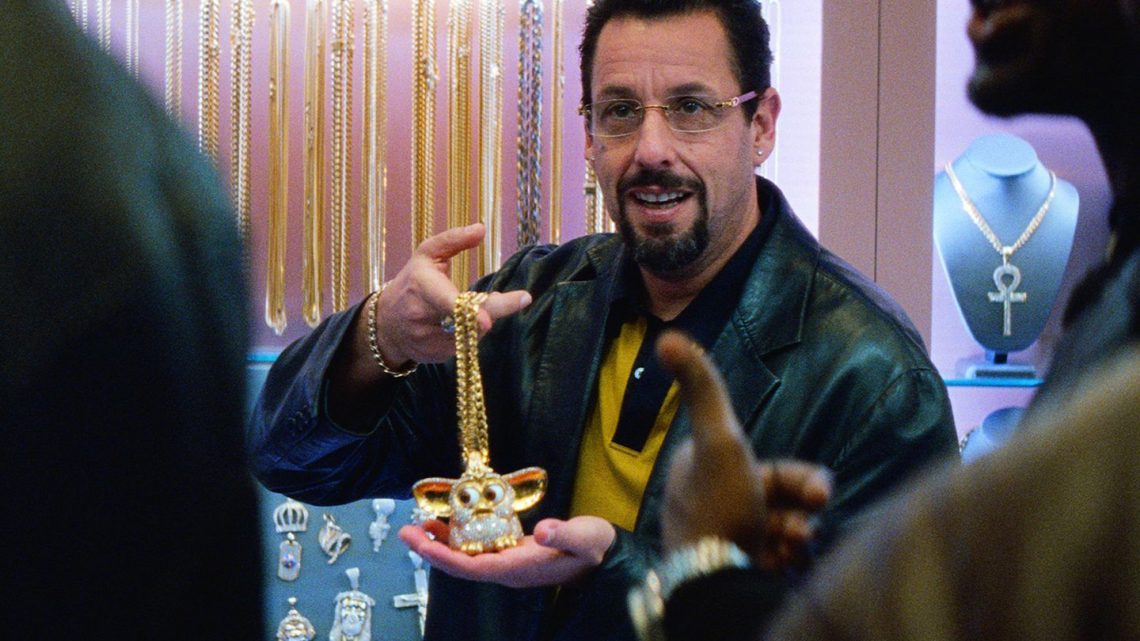By Jordan Hiller
For a movie released during Chanukah that takes place over Pesach, Uncut Gems sure lets its Purim flag fly. That is, everyone accounted for in this sordid tale of desperate, flop-sweat-soaked deal-making wears a mask. What is real? Where does the script end and life begin? Who is performing and who is simply caught on camera? The film is a mesmerizing exercise in cinematic ad d’lo yada. Not that what takes place could only do so in the realm of fantasy – despite the dreamlike interludes and synth-heavy score. Quite the opposite. The celebrated Safdie brothers have delivered a serious holiday season lump of diamonds (yes, coal’s distant cousin). It is just that the characters within the narrative exposed operate with such irrepressible irrationality – whether they had one l’chaim too many or not – it is hard to attribute to them even the most basic common sense.
And, I use the word “exposed” both reluctantly and purposely. It is more than evident that the Safdies are insiders and that Uncut Gems is a peek into a world they feel uncomfortably comfortable in. Yes, their work is personal because it is about their New York, and art because it is multifaceted and the humanity of it shines through like polished carats, but – make no mistake – this is a revelatory and alarming Jewish experience. The most interesting question to contemplate when the curtain falls is what remains an extractable lesson? Is the film a subjective depiction of a few crazy people or an objective reflection of a community in crisis?
There is a passage in the Book of Esther when the evil vizier Haman gives the Persian Emperor his best reason to annihilate the Jewish people. It’s a blink-and-you-miss-it moment, but it goes like this: Haman said to King Achashverosh, “There is one nation scattered and dispersed among the nations throughout the provinces of your kingdom, whose laws are unlike those of any other nation and who do not obey the laws of the King. It is not in the King’s interest to tolerate them.” It’s a governmental bombshell. He is saying that the Jews live amongst us but they have ways and a system all their own, which they obey, to the exclusion of any societal norms or civilized code. It’s the call to arms of anti-Semites everywhere. And, with Uncut Gems, one representation of this alleged underworld – of this anarchistic typology – is on brazen display. Now, there are two ways to sociologically analyze the situation we now find ourselves in. The first is to cry out: My God, man! Keep the dirty laundry off the line! We do not need the world seeing this foul spectacle! And the other reaction is to appreciate the remarkable era we inhabit. That a nation of wandering despised outcasts can present a horrifying aspect of themselves with such raw ugliness and…get away with it. The most paranoid of people can presently commit themselves to unmitigated self-rendering. If you think there is a third possibility, study the history books and find enlightenment.
Let us be clear: Howard Ratner, the physical embodiment of all that is shyste, is not – by a Polish mile – a prototypical Jew. He is the irredeemable, detestable worst. But that is not to say the New York Jew will fail to recognize within his grandiose yet pitiable cons and persuasive yet nebbish whine bits and pieces of a dozen friends, relatives, and associates. We cringe, not only due to the extreme chilul Hashem factor, but because of the undeniable familiarity. Maybe we can’t put our finger on it, but damn, if what transpires on screen isn’t reminiscent of something we daily tread just on the outer edge of. In other words, we kind of know Howard and Dinah – the broken couple at the center of Uncut Gems’ over-the-top mess of a family. We know the mindless excess. We skate the hypocritical incongruity so aptly portrayed in the film via the Passover Seder where Jews must see themselves as both poor, oppressed slave and indulgent king. Howard is – with every shallow, weasely breath he manages – both. He is the ultimate slave. To his addictions, demons, sins, debts, and holes dug deep and dark. Yet, in the hands of a masterfully committed Adam Sandler, he is also the king, is he not? Ruling his kingdom of depravity, disorder, and lunacy, with mad-fool aplomb. He is the delirious captain of a sinking ship plugging an ever expanding menagerie of leaks with misguided confidence, improvisational genius, and hopeless delusion.
Surely then, as sophisticated Jews, we can disassociate from Howard and his bungling wretchedness. He is the stereotype of our nightmares come to vivid life. Yet – God help us – we root for the bastard until the bitter end.
How is that possible?
Maybe it’s because we are suckers for redemption. Even when some of us prove irredeemable. Or maybe it’s because we relate to that part of Howard that wants to make it in the big world and show them. The nerdy Jew can hang with rappers and athletes. Can leave the club with the stunning shiksa. An endemic national inferiority complex run amuck. Or maybe it’s just that the Safdies know the power of Purim. And that even more than engaging with the contradictions of Pesach or basking in the glow of Chanukah, we like to turn things upside down.









